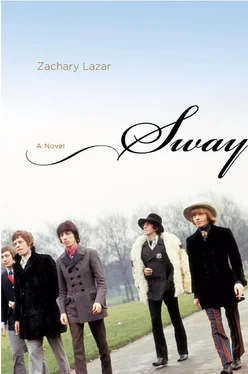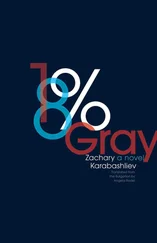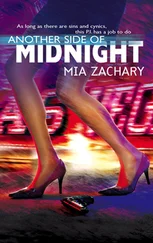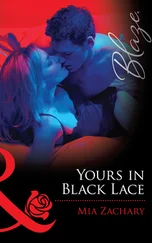“What happened last night?” Mick said, flipping his key in his hand.
Keith kept walking down the hallway. His T-shirt hung over his bare shoulders like a scarf and he tugged at the twisted ends. “That’s the big mystery, isn’t it?”
“I told Tom to keep an eye on him. Make sure he keeps it together.”
“Sort of like sending the dealer out to mind the junkie, isn’t it?”
“This is brilliant timing. We’re going to need him. You keep forgetting that. Unless we’re just going to pack it in.”
Keith scratched his shoulder. “Well, that’s up to Brian, isn’t it? I mean, either he’ll look after himself or he won’t.”
Keith went into his room and tossed his shirt on the bed. Lined up against the walls was the equipment that had been brought up for him on the day they’d arrived — the microphones, the tape machine, the acoustic and electric guitars, all the tangled gray cords. He stared at it for a moment, then went out on the balcony and looked down at the pool.
He could see her moving through the water, her brown arms pushing down toward her sides. She kicked her legs so that her back and shoulders rose up above the surface, her wet hair seeping down her neck.
He went back inside and switched on the TV without any sound and lit up a joint. He could feel it starting to gather in the back of his mind, but it had been almost a month since he’d written a new song and he also felt lethargic. It would either come in a flash, which was rare, or it would come out of trial and error. Either way it wouldn’t be a song until it went through hours of plodding and revision, drudgery and repetition, the exact opposite of the sound that only sometimes, inexplicably, emerged.
The last time they’d recorded, he’d spent five days in the studio with just Brian, working out the song. They’d added piano, cello, flute, recorder — small harmonic lines that pushed the song slowly outward until it was something you could listen to many times and still want to hear again. He’d watched Brian pick up instruments he’d never played before and just start playing them, doing it while he was so stoned he seemed hardly awake. Without Brian, the song would have been nothing more than some Baroque guitar studies he’d been tinkering around with by himself — Bach, Vivaldi — but together they’d managed to smooth away the worst part of that and fuse it to the simple, three-chord music they were known for. The song was about Anita — even Brian must have realized it. It was about the runaway girl who couldn’t be tamed, the girl you would have to share if you wanted to be with her at all.
What was amazing then was that it seemed as if Brian were going to pull it together, be a true part of the band again. That’s what she had done for him at first. But on the drive down to France, it was obvious what was happening, and Brian hadn’t even noticed. He’d just made it easier and easier for Anita to forget about him when he finally broke down. He kept changing the music and insisting that this was the way the band should go, back to the blues, the old songs they used to cover when it was still fun to play and everyone got along. He would be sentimental, then angry, then half-asleep, vague with liquor and pills, and he had been like that so often that it was not upsetting, just irritating, familiar. Still, they had never seen him cough up blood before: thin red drips that spotted his chin and a darker kind that rimmed one of his nostrils. Suddenly they were speeding through Toulouse, looking for a hospital, thinking he might die. He’d wanted Anita to stay there at his bedside, but she’d felt worn down by then. He had stopped coughing. It had already started to seem like another one of his games.
They left him there after the first night. It was a cold thing to do, but he’d told them to go. They got back in the Bentley with Tom Keylock and headed south toward the border town of Port-Bou. It was a sunny day and they crossed the Pyrenees into Spain, where they could see cactuses and yuccas growing between the rocks on the sides of the road. They smoked some hash and listened to the reel-to-reel tape player, and their lives — even Brian’s — suddenly seemed funny in a way they hadn’t seemed since leaving London. She was laughing the first time she kissed him, and he could hardly concentrate on her body, her tan thighs spread across his hips, her breasts, which he felt for the first time through the thin fabric of her acrylic shirt. It had happened so fast that only afterward did it really sink in, the reality of this girl who was so beautiful he used to keep sneaking glances at her to make sure he wasn’t exaggerating it.
Brian stood up and walked over to the edge of the pool. She looked up at him, wiping some water off the side of her face.
“We’re going to go hear some music,” he said. He turned back toward the table, where Tom Keylock was still sitting. “He’s going to take me into town.”
She rested her arm on the glazed tile, looking down at her fingers. “I think it’s a good idea,” she said.
“I’d like to find some instruments to bring back to London. Something different.”
“I think we should just cool off for a while, don’t you? I mean, just for the day. I think it will be good for us.”
He looked away. For a moment, everything that had happened last night — the calmness of her voice, the tight soreness in the bones of his hand — came back, jumbled together with the sunlight on the patio, the green and white reflections on the swimming pool, the coarse gray bark of the palm trees.
“You should go and hear the music,” she said. “Try not to think about everything so much.”
He nodded. Across the pool, there was a waiter in a white jacket and a white fez clearing glasses from one of the empty tables. Anita smiled, touching his bare ankle with her wet hand.
“It’s just for one day,” she said. “Not even a whole day. Everything’s going to be fine.”
He had never felt like this. Jealousy, fear, hopeless antici- pation — these were familiar feelings, but he had never felt them with such claustrophobic intensity. It made his pulse thick and prolonged, worse the more he tried not to think about it. Everything he didn’t want to believe about himself was once again suddenly, explicitly true. Could he go for one day — not even a whole day — knowing that she was out of his control? It was like deciding that nothing between them had ever mattered.
An hour later, she and the others were in a tiny carpet shop owned by a man named Hassan, sampling different kinds of hash while they listened to Moroccan music on the radio. The walls were an even, vibrant blue that made it difficult to remember what time of day it was. Keith leaned back against the wall on a pile of carpets, his eyes closed. She was curled up beside him, her arm entwined with his. She wore white boots, her legs bare and tan, and beneath her straight blond hair she had a feather boa wrapped tightly around her neck like a scarf. Mick and Marianne and Robert Fraser were on their right, looking at a book of Arabic calligraphy. As usual, someone was taking pictures, and so the last hour had been full of vivid reactions to minor events, canny smiles and thoughtful stares and a minimum of talk.
“It’s better now, isn’t it?” she said.
“Yes. It’s always good to have a smoke.”
“I want to go for a walk later in the market. I want to buy something for Brian. Something to cheer him up.” Her smile was the smile of someone who never felt any difference between acting and being herself. “Don’t be solemn,” she said.
“I wouldn’t dream of being solemn.”
“We’re all friends. It’s a simple idea, but no one seems to understand it anymore.”
“We are friends.”
Читать дальше












